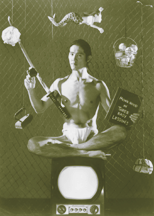Swinging At Types
Dan Kwong takes a big cut at Asian and male stereotypes
By Bernice Yeung
'MY LIFE'S dream has been to play center field for the L.A. Dodgers," confesses performance artist Dan Kwong. Luckily, continues Kwong, "I have found a way through performance art to do things I've always wanted to. I am able to create mutations of life and fulfill dreams harder to realize otherwise."
Indeed, the writer/producer/performer of the one-man multimedia show Monkhood in 3 Easy Lessons lives almost vicariously through his art. The material is autobiographical, but Kwong exercises full artistic liberty on stage, creating scenes that allow him to attain somewhat unrealistic goals.
Since Kwong probably won't be joining the Dodgers, he incorporates the national pastime into performance pieces like "Monkhood," taking swings at Asian stereotypes rather than baseballs. In "Secrets of the Samurai Center Fielder," written in 1993, Kwong transforms himself from Japanese warrior to center fielder, a reflection of the middle ground--half Japanese and half Chinese--on which he stands.
Throwing curveballs at his audiences is standard practice for Kwong, who is known for his nonlinear theatrical sequences and his use of martial arts, traditional Japanese sword techniques and a variety of unorthodox media. In "Monkhood" (1995), for instance, Kwong collages storytelling, poetry, video, slide projection and athletics to explore "male identity from an Asian American perspective."
"Monkhood" looks at masculinity from a variety of angles, touching on issues such as male emasculation and society's definition of "machismo." The piece includes monologues about Kwong's grandfathers, a dance inspired by a poem celebrating boyhood, and an interview with an infant Kwong about his expectations as an Asian American male.
"Men's liberation is something I feel very passionately about," Kwong explains. "It's easy to ridicule, because it seems like men are in dominant roles, but there are ways in which men are systematically dehumanized. As males, we need to reclaim the ability to feel, which is a loss of a huge part of our humanity. It gets confusing. ... How can you be both the victim and the oppressor at the same time? But you can never end sexism until we end men's oppression and the ways society dehumanizes males."
Kwong's artistic talents also extend to the technical. He designs, creates and constructs most of his sets, props and costumes, skills that he attributes to his working-class upbringing.
"Class identity is a huge factor in shaping people's attitudes," Kwong says. "I was raised more working-class, which has affected me behind the scenes. I learned how to be a handyman growing up. When something breaks, and you don't have money to buy it new, you have to fix it yourself. As a consequence, a huge amount of the props, sets and costumes are created by my hands, and I take great pride in that."
[ Metro | Metroactive Central | Archives ]
This page was designed and created by the Boulevards team.

Samurai Dreaming: The detritus of cultures East and West close in on performance artist Dan Kwong in "Monkhood in 3 Easy Lessons."
Monkhood in 3 Easy Lessons, presented by the Contemporary Asian Theatre Scene (CATS), plays FridaySaturday at 8pm at The Stage, 490 S. First St., San Jose. Tickets are $10. (408/283-7142)
From the July 25-31, 1996 issue of Metro
